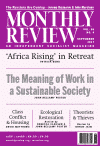2017

Historians have long documented the ways that capitalism drew its early accumulation from the dispossession of commonly owned resources—a process that continues to this day. Building a socialist society and economy can be thought of as a reversal of this process—a reclaiming of commons. The resources that contribute to human development do so best when shared and governed democratically. This includes not only the forests and fields of the pre-capitalist past, but also education and health care systems, parks and streets, waterways, and the shared culture, knowledge, and productive resources of a society. | more…

As the global economy grows increasingly unstable, undermining job security and the dignity of work, the IWW’s pioneering tactics, and perhaps even the union itself, may again be the means by which working people of all walks secure “the good things in life” while building “a new society within the shell of the old.” | more…

The groups fighting white supremacy in Charlottesville and elsewhere represent a cross-section of the U.S. left, from socialists to communists to anarchists. Together, they affirm that to combat the new right-wing resurgence, it is necessary to combat capitalism itself. | more…

The Bolivarian Revolution in Venezuela has always been shaped by the dangers and demands of achieving socialism through democratic means. Only by reckoning with that complexity can we understand both Venezuela’s current crisis and its recent history. | more…

Benjamin’s philosophy presents problems best addressed not academically, but in dialogue with living political processes. And it is in Latin America, particularly Venezuela, that Benjamin’s ideas have been most vividly illustrated and interrogated. | more…

Women's Labor and Resistance in Eastern India
Neoliberal development has opened the eastern Indian state of Odisha to mining companies and steel conglomerates, threatening the region’s ancient subsistence economies and provoking a fierce resistance, in which women have taken a leading role. | more…

Despite its inherent hazard of excess capacity, capitalism is distinguished by the vast, long-run expansion of its productive forces. How come? To answer this, we need to move from theory to history. | more…

At their best, worker cooperatives are among the most effective examples of radical democracy in action. A recent vogue for cooperatives as high-tech entrepreneurial endeavors, however, seeks to expand rather than challenge the rule of market economics. | more…

The publication last month of The Age of Monopoly Capital: The Selected Correspondence of Paul A. Baran and Paul M. Sweezy, 1949–1964, edited by Nicholas Baran and John Bellamy Foster, constitutes a landmark for Monthly Review Press. A historical document in itself, The Age of Monopoly Capital is not simply about the writing of their magnum opus, but also provides a window onto an entire era of American life. | more…

The idea of total liberation from work, in its one-sidedness and incompleteness, is ultimately incompatible with a genuinely sustainable society. The real promise of a system of labor beyond capitalism rests not so much on its expansion of leisure time, but rather on its capacity to generate a new world of creative and collective work, controlled by the associated producers. | more…

The present Russia panic follows an entire century of fearmongering and “threat inflation,” dating to the Russian Revolution, that has long served the interests of the U.S. military-industrial complex and security state. It has had little to do with either Russian or American realities, which have been consistently distorted. | more…

The neoliberal export-oriented strategy has done enormous damage to Africa’s human development, gender equity, and natural environment. Reversing this project is the major challenge for Africans who resist injustice, through which they can build solidarity with the rest of the world’s oppressed peoples. | more…

Class Conflict and Public Housing in Britain
Class conflict, from both below and above, has long shaped the history of housing in Britain. These struggles continue today, as the ravages of neoliberalism have forced public housing once again onto the agenda in the United Kingdom. | more…












